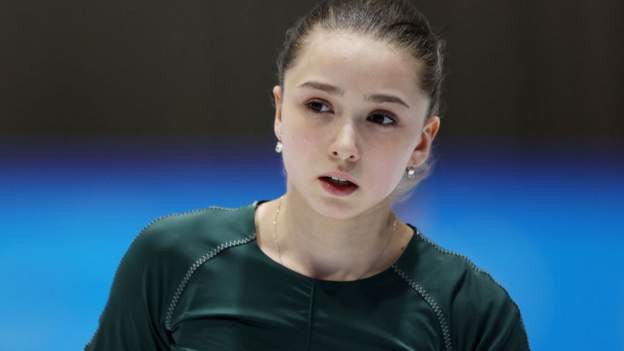[ad_1]
| Hosts: Beijing, China Dates: 4-20 February |
| Coverage: Watch live on BBC TV, BBC iPlayer, BBC Red Button and online; listen on BBC Radio 5 Live and BBC Sounds; live text and highlights on BBC Sport website and mobile app |
Russian figure skater Kamila Valieva has argued her positive drugs test was due to contamination with her grandad’s medicine, an Olympic official says.
The 15-year-old failed a test but is being allowed to compete at Beijing 2022 after a court ruled on Monday ruled that a provisional suspension should not be re-imposed.
“Her argument was this contamination happened with a product her grandfather was taking,” the International Olympic Committee’s (IOC) Denis Oswald told reporters.
Valieva discovered a week ago that she had failed a drugs test but then successfully appealed against a Russian Anti-Doping Agency decision to impose a provisional suspension.
That decision was upheld by the Court of Arbitration for Sport on Monday after appeals by the IOC and others.
It cleared the way for Valieva to continue participating at the Games and she will launch her big for gold in the women’s figure skating competition on Tuesday.
She says she is “happy” but “emotionally tired” after the past week.
The pre-Games favourite, who had already wowed judges to help the Russian Olympic Committee to victory in the team event, continued training – in front of the cameras – amid uncertainty over whether she would be able to carry on competing.
“These [past] days have been very difficult for me,” Valieva, who sometimes looked tearful at the training rink, told Russia’s Channel One television.
“It’s as if I don’t have any emotions left. I am happy but at the same time I am emotionally tired.”
Russia, which is banned from competing at the Games under its own flag because of its doping history, has come under the spotlight once again because of this case.
But Oswald, who chaired the IOC commission that looked into doping violations by Russian athletes at the 2014 Sochi Games, said that at this stage it looked like there was “no connection with the institutionalised doping we had in Sochi” but that it was difficult to have an opinion yet without all the details.
Valieva already knows that if she were to win a medal in the women’s event, which starts on Tuesday with the short programme and concludes on Thursday with the free skate, the IOC has decided there will be no medal ceremony.
“We want to allocate the medal to the right person,” Oswald, the permanent chair of the IOC’s disciplinary commission, said.
“As long as the decision regarding the doping case of this athlete has not been clarified – she has delivered a positive sample – until we have a clear situation then we will not allocate the medals.”
The World Anti-Doping Agency (Wada) is investigating Valieva’s entourage, including coaches, doctors and other adults surrounding her, with Oswald adding that a “15-year-old would not do something wrong alone”.
Meanwhile, she is still the subject of an anti-doping investigation for the failed test. Oswald said she had not yet requested the testing of her B sample, which forms part of that process.
Under Wada rules athletes whose A sample tests positive are entitled to ask for their B sample to be tested.
The case still has a long way to run and there are many questions to answer, but we will get one answer later on Tuesday to the question over how this will have all affected Valieva’s performances on the ice.
The Russian says she has been supported by messages on social media, adding: “When I open Instagram, I can see so many good wishes and so much belief. I’ve seen that in Moscow there are even billboards which say ‘Kamila, we’re with you’. It is very nice.
“And in these difficult moments this support is very important for me.”
[ad_2]

